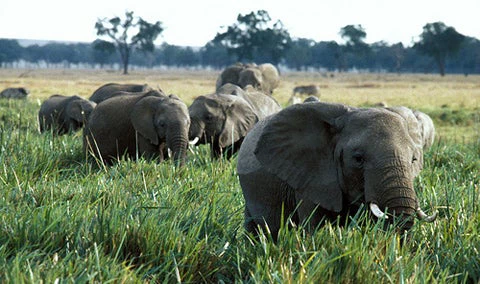Available in ไทย
Elephant ivory is on the march. Not elephants, but their ivory. The elephants are left bloodied and dead on the range. So are many rangers who work to protect a country’s natural capital. In the past 10 years, over 1,000 rangers have been murdered in 35 countries alone; the International Ranger Federation tell us that as many as 5,000 may have been murdered worldwide in that time.
At the CITES COP – the Conference of the Parties to the Convention on International Trade in Endangered Species – the halls in Bangkok ring loud with concern for the elephants and other charismatic species, particularly rhinos, that are being exterminated across Africa in pursuit of private profit, at the expense of communities that rely on nature for their food, shelter, start-up capital, and safety net in a warming world.
So why should the World Bank care? Our concern is to build strong economies and healthy communities by revving the engine of inclusive green growth as we prepare countries and communities for the impacts of climate change.
What does this have to do with elephant ivory you ask? Simply put, we cannot achieve our dream of a world without poverty without taking account of the rise in wildlife crime.
Beyond the immediate impacts of liquidating wildlife that otherwise could serve as a vehicle for public and private sector investment in rural areas – think nature-based tourism – wildlife crime is leading to the proliferation of guns in exactly those areas that need less conflict, not more; it is providing money for corruption, in exactly those countries in which corruption has already stalled all pro-poor decision-making and doing business legitimately is already hard enough; and it is oiling the engine of crime and polluting efforts at good governance, democracy and transparency in exactly those communities that need more voice, not more silence. It is anti-worker, anti-women and anti-poor.
So what must we do?
First, what we mustn’t do – cut down our clients at the knees by undermining their law enforcement efforts. When we support trade facilitation and customs modernization, we must do so by including attention, technology and training to wildlife trade. When we support park management, we must not forget to pay attention to the needs and safety of the rangers who work on the front-lines. We must not focus solely on assigning blame but inventing in solutions and building networks for success.
Instead, we must stand strong in the face of a growing transnational, organized criminal risk to development investments, good governance, and our dream of a world without poverty.
We must provide the broad shoulders on which our clients can stand. We must work across sectors and ministries; just as the criminal networks reject silos and innovate for success, so too must we. We just have to be better.
We must continue our support and active involvement in the International Consortium for Combatting Wildlife Crime.
We must continue to provide support to range states to put boots on the ground that are well trained, well equipped and well protected.
We must follow the money and deploy our anti-money laundering tools and training to make the risks of wildlife crime greater than the rewards by increasing the cost of doing business.
We must work with politicians, judges and prosecutors and law enforcement agencies to build political will, organize departmental support, and improve professional services.
This is a fight to save not just the elephant or the rhino, or particular species of sharks or rosewood. It is a fight for our ability to build resilience in a warming world, to share prosperity built from natural capital, and to protect our own humanity. It is a fight we simply can't afford to lose.



Join the Conversation